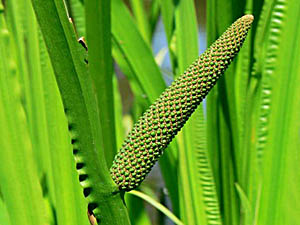Calamus
- Calamus is a plant. The root (rhizome) is used to make medicine.
Contents
Uses
- Despite safety concerns, calamus is used for gastrointestinal (GI) problems including ulcers, inflammation of the stomach lining (gastritis), intestinal gas (flatulence), upset stomach and loss of appetite (anorexia). Calamus is also used as a calming medicine (sedative), to induce sweating, and to treat rheumatoid arthritis and stroke.
- Some people chew calamus to remove the smell of tobacco, as a stimulant, to increase their sense of well-being, and as a hallucinogen.
- Some people apply calamus directly to the skin to treat certain skin diseases.
- In foods, calamus is used as a spice.
Benefits
- It is thought that chemicals in calamus cause muscle relaxation and sedation.
Cautions
- Calamus is LIKELY UNSAFE when taken by mouth. It can cause kidney damage, shaking, and seizures.
- The FDA prohibits calamus use in food products because three of the four species of calamus found in the world contain a cancer–causing chemical called beta-isoasarone. However, the beta-isoasarone content can vary widely among species from 0% to 96%. Some products may be safer than others.
- Pregnancy and breast-feeding: Calamus is LIKELY UNSAFE when taken by mouth during pregnancy or breast-feeding. Avoid use.
- Heart conditions: Calamus might lower blood pressure and heart rate. In theory, large amounts of calamus might worsen heart problems in some people with heart conditions.
- Low blood pressure: Calamus might lower blood pressure. In theory, taking calamus might make blood pressure become too low in people with low blood pressure.
- Surgery: Calamus can affect the central nervous system. It might cause too much sleepiness if combined with medications used during and after surgery. If you are using calamus despite safety concerns, stop using it at least 2 weeks before a scheduled surgery.
Interactions
Moderate Interaction Be cautious with this combination
- Medications for depression (MAOIs) interacts with CALAMUS: Calamus contains a chemical that affects the body. This chemical might increase the side effects of some medications used for depression.
- Some of these medications used for depression include phenelzine (Nardil), tranylcypromine (Parnate), and others.
- Sedative medications (CNS depressants) interacts with CALAMUS: Calamus might cause sleepiness and drowsiness. Medications that cause sleepiness are called sedatives. Taking calamus along with sedative medications might cause too much sleepiness.
- Some sedative medications include clonazepam (Klonopin), lorazepam (Ativan), phenobarbital (Donnatal), zolpidem (Ambien), and others.
Minor Interaction Be watchful with this combination
- Antacids interacts with CALAMUS: Antacids are used to decrease stomach acid. Calamus may increase stomach acid. By increasing stomach acid, calamus might decrease the effectiveness of antacids.
- Some antacids include calcium carbonate (Tums, others), dihydroxyaluminum sodium carbonate (Rolaids, others), magaldrate (Riopan), magnesium sulfate (Bilagog), aluminum hydroxide (Amphojel), and others.
- Medications that decrease stomach acid (H2-Blockers) interacts with CALAMUS: Calamus might increase stomach acid. By increasing stomach acid, calamus might decrease the effectiveness of some medications that decrease stomach acid, called H2-Blockers.
- Some medications that decrease stomach acid include cimetidine (Tagamet), ranitidine (Zantac), nizatidine (Axid), and famotidine (Pepcid).
- Medications that decrease stomach acid (Proton pump inhibitors) interacts with CALAMUS: Calamus might increase stomach acid. By increasing stomach acid, calamus might decrease the effectiveness of medications that are used to decrease stomach acid, called proton pump inhibitors.
- Some medications that decrease stomach acid include omeprazole (Prilosec), lansoprazole (Prevacid), rabeprazole (Aciphex), pantoprazole (Protonix), and esomeprazole (Nexium).
Other Names
Acore Odorant, Acore Olorant, Acore Roseau, Acorus americanus, Acorus calamus, Acorus gramineus, Acorus Roseau, Bach, Belle-Angélique, Cálamo, Cinnamon Sedge, Flagroot, Gladdon, Grass-Leaf Sweetflag, Grass Myrtle, Kalmus, Myrtle Flag, Myrtle Sedge, Sadgrantha, Sweet Calamus, Sweet Cane, Sweet Cinnamon, Sweet Flag, Sweet Grass, Sweet Myrtle, Sweet Root, Sweet Rush, Sweet Sedge, Ugragandha, Vach, Vacha, Vachha, Vaj, Vayambur.
References
Source: WebMD, “Calamus”, www.webmd.com/vitamins-supplements/

